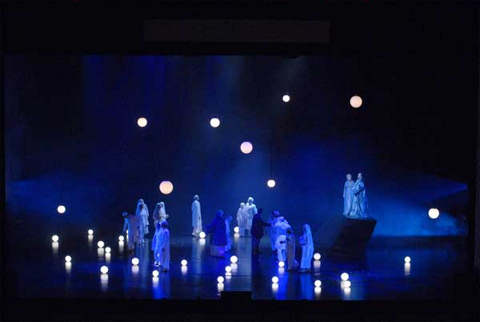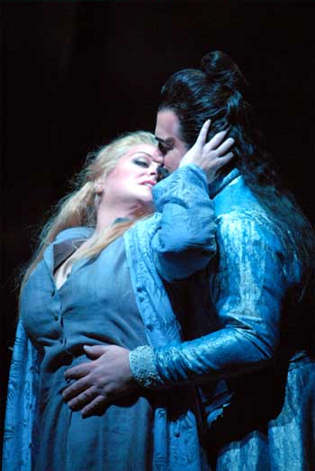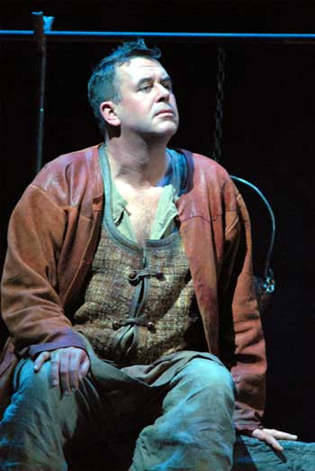Other Links
<Editorial Board
- Editor - Bill Kenny
- London Editor-Melanie Eskenazi
- Founder - Len Mullenger
Google Site Search
SEEN
AND HEARD INTERNATIONAL OPERA REVIEW
Strauss, Die Frau ohne Schatten:
Soloists, Chorus and Orchestra of Lyric Opera of Chicago, Sir
Andrew David (conductor), Lyric Opera of Chicago, Chicago
9.12.2007 (JLZ)
Production:
Stage
Director: Paul Curran
Since its premiere in 1919, Strauss's Die Frau ohne
Schatten has held the stage in various styles of productions
that continually bring the opera to new audiences. Hugo von
Hoffmannstal's libretto offers a kind of morality plan about
humanity, forgiveness, and redemption within its overt
fairy-tale elements and as such brings to the stage various ideas
that intersect with some of Strauss's other operas. Because of its
affinities with fairy tales and overt symbolism, some compare
Die Frau ohne Schatten with Mozart's Die Zauberflöte,
with both works eliciting lively responses about interpretation.
More than that, Die Frau ohne Schatten remains one of
Strauss's most appealing works, and with its new production for
the 2007-2008 season, Lyric Opera of Chicago succeeds in
presenting this important opera intelligibly and artistically.
Yet it is the music that matters, and Lyric succeeded in rendering
it well. One of Strauss's more demanding works for the stage,
Die Frau ohne Schatten requires the excellent cast found in
this production. In the title role Deborah Voigt embodies the
Empress vocally and physically. Ms Voigt captures the character
well and demonstrates her facility in this role, which fits her
voice perfectly She met all the demands of the part deftly, and
conveyed them with grace and ease. Her dynamic levels balanced the
varied orchestral textures encountered in this work, not
only in the fuller passages, but also in some of the chamber-music
like sections. Her diction and pitch were effective throughout
the performance, as was her stage presence: even though the
Empress does not sing extensively, her physical presence is part
of all but a few scenes in the opera. Ms Voigt is fully in her
element in this challenging and rewarding role. Known to Lyric
audiences for various roles, including Salome, she is an
attractive Empress, and her command of the role is impressive. She
is particularly effective in the penultimate scene of the third
act, where the Empress decides not to take the easy route in
helping herself, but to leave the Dyer's Wife her shadow and so
preserves the Dyer's marriage. Ms Voigt shimmers in this scene,
which includes music that calls to mind the Ewigkeit-Motiv
from Wagner's Siegfried (an idea that Mahler also developed
in his Second Symphony).
The Dyer's Wife has yet other demands, but Christine Brewer
made light of the difficulties. As the sometimes peevish wife of a
human purveyor of dye, this woman is not exactly pleased with her
lot, and in the course of the opera her character must grow to
appreciating her husband and her marriage with him. Ms Brewer uses
the appropriate vocal edge to convey the dissatisfaction of the
Dyer's Wife during the first scenes in which she appears, and the
incredulous wonder at the temptations offered her later
appeared wholly believable. Yet the abruptness in character
never affected Brewer's vocal delivery, which was always reliable
and inviting. Her performance was most persuasive at the end of
the second act, where she lies to the Dyer about selling her
shadow and then realizes her mistake; and the first scene of the
third act, where she acknowledges her feelings for the Dyer in the
scene that has both of the characters imprisoned.
Set and Costume Designer: Kevin Knight
Lighting Designer: David Jacques
Ballet Mistress: August Tye
Chorus Master: Donald Nally
Choreographer: Andrew George
Cast :
Empress: Deborah Voigt
Dyer's Wife: Christine Brewer
Emperor: Robert Dean Smith
Barak: Franz Hawlata
Nurse: Jill Grove
Geisterbote (Spirit Messenger): Quinn Kelsey
Falke (Voice of the Falcon): Stacey Tappan
Hunchbacked Brother: John Easterlin
One-Eyed Brother: Daniel Sutin
One-Armed Brother: Andrew Funk
Additional cast:
Andriana Chuchman
Marjorie Owens
Amber Wagner
Elizabeth De Shong
Meredith Arwady
Daniel Billings
Phillip Dothard
Paul Corona
Bryan Griffin

The concepts behind Lyric's production supported the narrative of
the opera well, with the loomy space of the otherworldly palace
contrasting the more confined quarters assigned to the human world
of the Dyer and his family. While most of the action in the first
two acts moved between those two settings, the Empress's hunting
scene with the falcon used the height of the stage to fine effect,
with the human-scale bird juxtaposed to almost the full expanse of
the visible flyspace. Likewise, the entrance of the Emperor on the
horse contributed to the tasteful stage magic that is essential to
other scenes in the opera. With the third act, the challenge of
portraying loci in another world benefited from sensitive
suggestion of the various places without overly ornamented or
detailed scene-painting. As minimal as it was, the use of beams of
light to indicate the underground chambers for the Dyer and
the Dyer's Wife in the first scene of the third act allowed the
audience to concentrate on the music and text: the almost-touching
hands made the desire to reconnect even more tantalizing than if
the pair were separated by some sort of barrier. As dark as some
of the settings of the third act may be, the globes that accompany
the unborn children at the end of the opera used the contrast of
the light with the sometimes oppressive darkness that preceded it
extremely skilfully.

Likewise, Jill Grove was also memorable as the Nurse, a character
who accompanies the Empress throughout much of the opera. Her
rich, flexible mezzo made her portrayal stand out for the for its
consistent sound and fine tone. Tone was consistently resonant
throughout the differing registers required by this role,
especially the passages that move into the higher parts of her
instrument. Phrasing and diction shaped the various exchanges with
the Empress and other characters elegantly, and her acting made
the role work. As the vehicle for some of the magic that must
occur in various scenes, the Nurse must have a fine sense of
timing, and Ms Grove certainly contributes that . All in all, she
was compelling as the Nurse, and clearly the role works well for
this fine performer.

The latter scene (Act III , scene 1) is one of the more touching
points of Die Frau ohne Schatten, and Lyric did well
to make it integrate. With each of the two characters declaring
their feelings about each other in close proximity, yet never
actually addressing each other directly, the scene is crucial to
understanding the powerful reunion of the pair at the opera's
ending - Strauss composed interjections from the Dyer and
his Wife in the subsequent scenes, but those portions were cut
from this production. The staging of the two individuals confined
in shafts of light and coming nearer to each other showed
their apparent separation, yet the music itself presaged the
renewed commitment that would occur when their lines intersect
later in the scene - including a reminiscence of the Finale
from Der Rosenkavalier. Ms Brewer worked well with
Franz Hawlata in this scene and others, and the dynamism between
them and others in the cast made this a memorable production of
Die Frau.
Hawlata himself is a fine Dyer, and his shaping of the role stood
in contrast to his more aggressive role as Baron Ochs in Lyric's
Rosenkavalier in a recent season. His bass-baritone timbre
was pleasant and his singing precise. At the same time,
Roger Dean Smith made the taxing role of the Emperor sound
effortless. His extended scene with the Falcon demonstrated his
fine stage presence and effective pacing of his part and he
made a strong and clear cointribution to the pivotal quartet at
the end of the opera. In fact, this concluding ensemble defined
this production, with its balanced cast of world-class performers.
The principals, the additional voices, and the chorus placed in
the wings, worked together practically seamlessly. Led by Sir
Andrew Davis, this production of Die Frau ohne Schatten
left a lasting impression for its excellent presentation of this
extraordinary opera.
James L. Zychowicz
All pictures © Lyric Opera of Chicago
